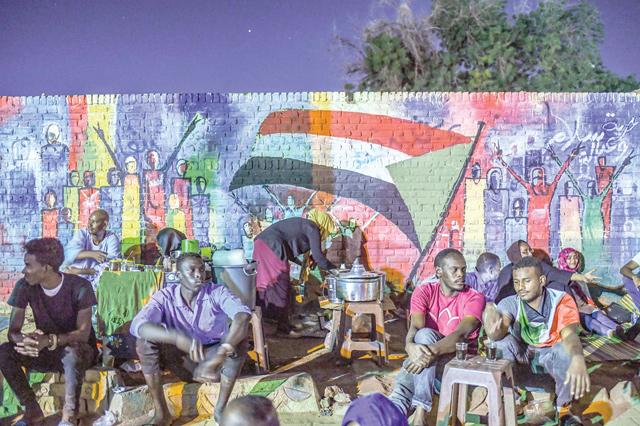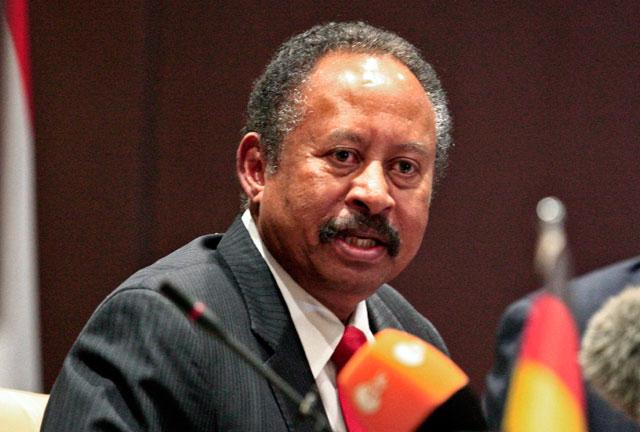You are here
Sudan to launch historic transition to civilian rule
By AFP - Aug 15,2019 - Last updated at Aug 15,2019

In this file photo taken on April 24, Sudanese protesters sit in front of a recently painted mural during a demonstration near the army headquarters in the capital Khartoum (AFP photo)
KHARTOUM — Sudan's military rulers and protest leaders on Saturday are scheduled to sign a landmark deal reached after a bloody uprising which is meant to pave the way for civilian rule.
The ceremony will officialise a constitutional declaration inked on August 4 between the country's Transitional Military Council and the opposition coalition of the Alliance for Freedom and Change.
The deal brought an end to nearly eight months of upheaval that saw masses mobilise against the 30-year rule of Omar Al Bashir, who was eventually ousted in April.
The deal brokered by the African Union and Ethiopia was welcomed with relief by both sides, with protesters celebrating what they saw as the victory of their "revolution" and generals taking credit for averting civil war.
While the compromise meets several of the protest camp's key demands, its terms leave the military with ample powers and its future civilian government with dauting challenges.
With the official signing of the transitional documents on Saturday, Sudan will kick off a process that will include important immediate first steps.
The composition of the new transitional civilian-majority ruling council is due to be announced on Sunday, followed two days later by the naming of a prime minister.
The Cabinet is due to be unveiled on August 28, with the newly-appointed ministers due to meet the sovereign council on September 1 for the first time.
Elections must be held after the 39-month transitional period that began on August 4.
Just paper?
Until then, the country of 40 million people will be ruled by the 11-member sovereign council and by a government which the deal makes clear will be dominated by civilians.
There are exceptions for the posts of interior and defence ministers, which are to be chosen by military members of the council.
The move towards civilian rule could lead the African Union to lift the suspension slapped on Sudan in June after a bloody crackdown on a sit-in in Khartoum.
The legislative body to be formed within three months will be at least 40 per cent female, reflecting the significant role played by women in the protest movement.
The paramilitary force and intelligence services blamed for some of the worst abuses under Bashir and against the protesters are to be brought under the authority of the army and sovereign council respectively.
With many issues still unaddressed, however, observers warn that describing the latest events as successful regime change would be premature.
“Political dynamics will matter more than pieces of paper,” said Rosalind Marsden from London’s Chatham House think tank.
“The biggest challenge facing the government will be dismantling the Islamist deep state... which took control of all state institutions and key sectors of the economy, including hundreds of businesses owned by the military-security apparatus,” she said.
Whitewashing
The rise of Mohamed Hamdan Daglo, who is better known by his nickname “Hemeti” and commands the paramilitary Rapid Support Forces, as Sudan’s new military strongman is causing some concern.
He has close ties to Gulf monarchies, has amassed huge wealth since wresting control of gold mines in western Sudan and was a leader of the infamous Janjaweed militia accused of a genocidal campaign in the Darfur region.
The fate of deposed ruler Bashir, who is wanted by the International Criminal Court over Darfur, is also unclear.
He is due to appear in a Khartoum court on corruption charges on the day of the official signing.
Some within the protest camp feel the power-sharing deal did not do enough to curb the powers of the military and guarantee justice for demonstrators killed by security forces.
The whitewashing in recent days of walls that bore some of the many murals painted during the protests was seen as a bad omen.
“The signals we are getting tell us that there is no real change, no real freedom,” graffiti artist Lotfy Abdel Fattah told AFP.
Absent from Saturday’s ceremony are also the various rebel groups from marginalised regions such as Darfur, Blue Nile and Kordofan.
The Sudan Revolutionary Front that unites these movements has supported the protest movement but rejected the constitutional declaration, demanding representation in the government and more guarantees on peace talks.
Related Articles
KHARTOUM — Sudan's new premier will unveil the first Cabinet since veteran leader Omar Al Bashir's overthrow within 48 hours, the country's
KHARTOUM — Sudan's new prime minister was Thursday locked in talks to form the first Cabinet since the ouster of veteran leader Omar Al Bash
KHARTOUM — Close to 50 people have been killed in the latest outbreak of tribal violence in Sudan’s Darfur region, a government official and












